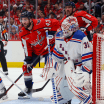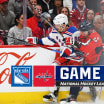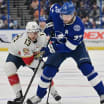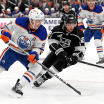PITTSBURGH -- The Pittsburgh Penguins will try to take a 2-0 lead in the Stanley Cup Final when they play Game 2 against the San Jose Sharks at Consol Energy Center on Wednesday (8 p.m. ET; NBCSN, CBC, TVA Sports).
Here are 5 keys for the Penguins in Game 2:
1. PRESSURE ON THE PK
The Penguins did a good job of keeping their composure and limiting San Jose's power play opportunities to two in Game 1. The Sharks converted on one of those two chances.
5 Keys: Pittsburgh Penguins, Game 2
Staying out of penalty box, another fast start important against Sharks

© Justin K. Aller/Getty Images
It's unrealistic to think the Penguins will stay out of the box completely in Game 2, so when they do have to kill penalties, they need to find their pressure points on the Sharks and attack those areas.
Pittsburgh did a particularly good job of pressuring San Jose's power play in Game 1 despite giving up a goal to Tomas Hertl in the second period. It was impressive because of how difficult it is to attack the Sharks' power play.
"You look at a team like [the Washington Capitals], where they have [Alex] Ovechkin and you look at Tampa, when [Steven] Stamkos was in, we had to have a meeting before just to focus on where he'd be," Penguins center Nick Bonino said. "This team, you give any of them space, guys like [Brent] Burns, [Joe] Pavelski, [Logan] Couture, they can all shoot the puck. You just got to make sure you're in lanes and if they're going to shoot, which they probably will, make sure it's the easy shot for Murrs [Penguins goalie Matt Murray]."
2. RUST'S STATUS
It's not yet clear if Penguins forward Bryan Rust will play in Game 2. He skated Wednesday morning, but is considered a game time decision, coach Mike Sullivan said.
Rust was injured on an illegal check to the head by Sharks forward Patrick Marleau at 4:47 of the third period in Game 1. He returned to play one shift before leaving the game and not returning.
Rust, a call-up from the American Hockey League this season, has become a vital player in the Penguins' lineup. His speed makes a difference on his line and has been an important factor in center Evgeni Malkin picking up his game.
Rust has six goals in the playoffs, including four in the past three games. He scored Pittsburgh's first goal in Game 1 after scoring each goal in a 2-1 win in Game 7 of the Eastern Conference Final against the Tampa Bay Lightning.
"He's scored a few goals here throughout the course of the postseason and I think his confidence is probably at an all-time high and that helps," Sullivan said. "Certainly he's a guy that we have viewed all season long as someone who can help us generate offense, whether he's scoring himself or he's creating opportunity for his linemates through his footspeed, through his tenacity, forcing turnovers and things of that nature like his compete level and willingness to go to the net."
3. FAST START
Sullivan and center Sidney Crosby talked after Game 1 about how the Penguins attacked early and didn't let themselves get into a wait-and-see, feeling-out first period. It was a big reason why they dominated the first with a 2-0 lead and a 15-4 edge in shots on goal.
The Penguins need to attack early again in Game 2. It will allow them to feel as dominant as they did in Game 1 and it will plant a seed of doubt into the Sharks' minds about whether they can skate with them.
"We need to come out and have another great start against them," Penguins defenseman Ben Lovejoy said. "We need to do everything we can to not let them get going, to not let them grind down low, to play with their skill. We need to try to have the puck as much as we can."
4. FILL THE LANES
Blocking shots was a key for the Penguins going into the series and it remains a key because of how good the Sharks are at getting their shots through and getting tips and deflections in front of the net.
The Penguins had a strong answer in Game 1 with 21 blocks, including 10 in the second period, when the Sharks were in control and had 27 of their 58 total shot attempts. The 21 blocks were nearly five more than the Penguins were averaging per game in the first three rounds (16.4).
"I'm a firm believer that when there is an opportunity to block a shot at this time of the year you have to do it no matter who you are," Lovejoy said. "I think guys in this room understand that."
But what if it's Burns winding up for a big blast from the point, do you hesitate at all?
"Not one bit," Lovejoy said. "You are actively rooting for it to hit you because that means it didn't go in the net."
5. BREAK THE FORECHECK
The Sharks are known for having an aggressive forecheck, but the Penguins, when they were on their game in Game 1, meaning playing fast, rendered that forecheck useless by breaking it quickly.
The Penguins broke the Sharks' forecheck to score their first two goals by retrieving the puck quickly and getting it up the wall even faster with players, Justin Schultz on the first goal and Crosby on the second, darting through the middle to get the puck and create the opportunity.
On Bonino's game-winner, it was Brian Dumoulin retreating back to get the puck, skating behind the net to avoid Hertl on the forecheck, and delivering it up the boards quickly. Phil Kessel chipped it into the zone and defenseman Kris Letang chased it down before setting up Bonino.
"It's huge," Schultz said of breaking the forecheck. "Getting back for pucks quickly and getting them out as quickly as you can, we've been doing that for a while now and it's been working. You saw in the first period we did that well and we had a great period. We kind of let off of that in the second and they took over a bit. It's just playing with speed."

















